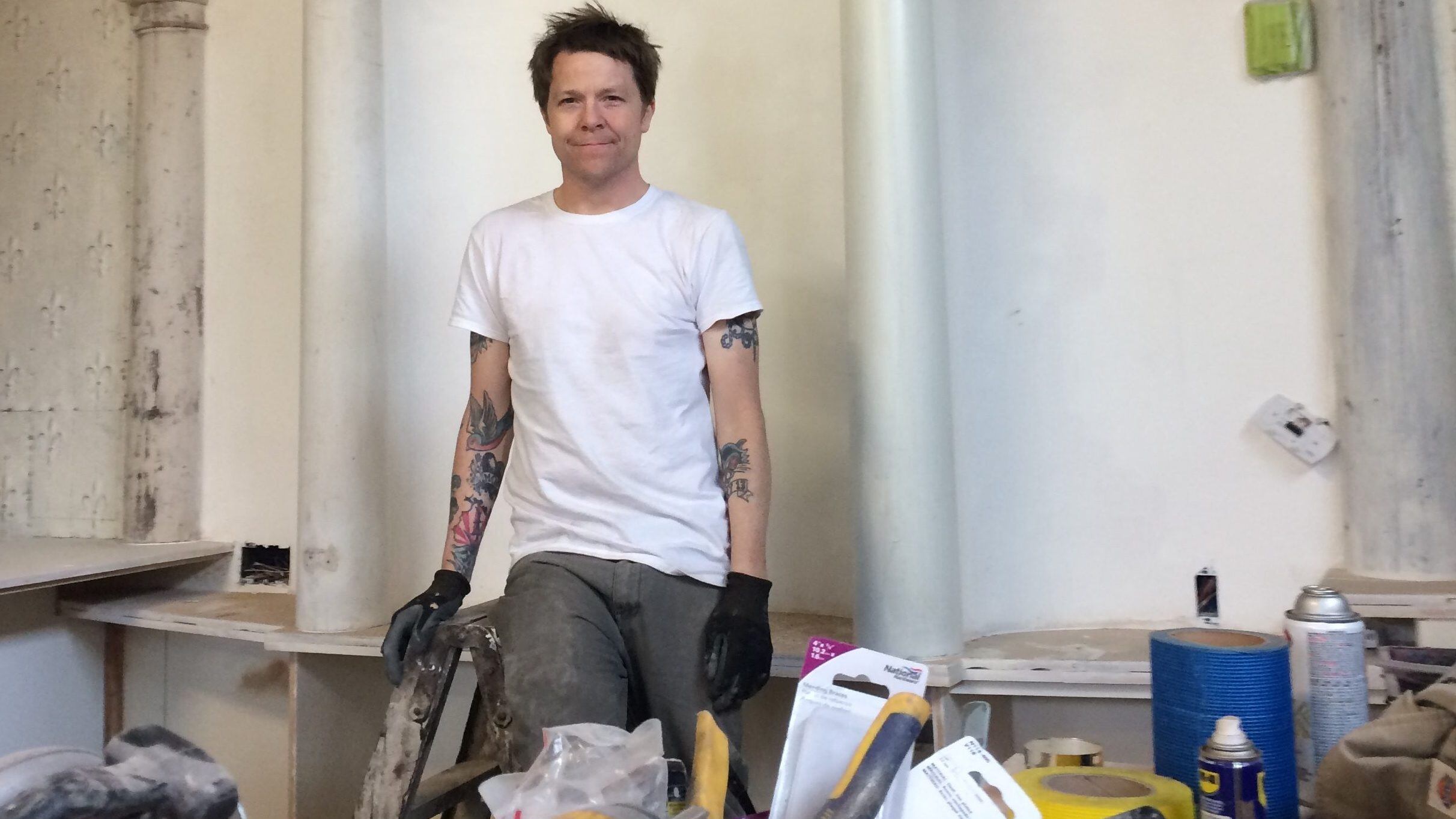On the evening of Monday, October 1, Jeffrey Wilson—known in Portland as Jeffrey Wonderful—died when his motorcycle crashed into a freeway barrier.
An irreplaceable resource and multifaceted talent truly beloved by all he knew, Wilson—Rose City Rollers co-founder, Hot Gun co-producer, Portland Organic Wrestling babyface, the Viles guitarist, Dandy Warhols' "Little Drummer Boy," Elvis Room designer—was above all else a good son, loving partner and, indeed, wonderful friend to this city.
Wilson was born April 19, 1977, at Adventist Hospital to Raymond Wilson and Rebecca Lynch of NortheastE Portland's Parkrose district. He would follow his brother Jason, six years older, to Sacramento Elementary and, for a time, Parkrose High School. Jeffrey Wonderful, as far as his mother could recall, was born about 16 years later upon a TriMet bus.
He'd just begun his first collaboration with future Portlandia mainstay Jedediah Aaker and had been busily scratching out mash notes and imagining potential merchandise opportunities.
"Riding the bus home, he sits next to a little old lady," Lynch says, "and starts telling her all about his new project—writing love letters, sending out t-shirts, making up bumper stickers. He didn't know what to call the thing, but she looks at him and says it should be called Jeffrey Wonderful. As simple as that."
Soon enough, stickers and 8×10 glossies reading "My other boyfriend is Jeffrey Wonderful" were plastered throughout the city. After taking out ads in places like Oregon City and The Dalles, Jed and Jeffery escorted perhaps a dozen young women to proms around the state.
"He dropped out of high school," Raymond Wilson recalls, "and people started calling him Jeffrey Wonderful. He sold t-shirts at shows. People would send him letters, and he'd write back as Jeffrey Wonderful. I was just a soccer coach out in Parkrose. I had no idea what happened [but] he found his community and friends of a lifetime at the X-Ray Cafe."
Related: Portland's Most Missed All-Ages Venues.
Like so many local kids of the era, Jeffrey and Jed were drawn to downtown Portland's X-Ray, the vastly-influential all-aged venue co-owned by future Voodoo Donuts tycoon Tres Shannon from 1991 to 1994. Beloved for open booking policies that shone a spotlight on emerging stars and the lunatic fringe alike, the X-Ray led to Wilson's stints as go-go dancer for all-girl "band" (they played no instruments) God's Favorite Pussy and as the Dandy Warhols' lighting tech and psychedelia projectionist. He'd find rather more lasting fame by starring in early Dandys videos "Theme Song" and "Little Drummer Boy."
"In many ways, the concepts that carried Jeff through his life came from the DNA of the X-Ray Cafe," says Jason Wilson. "He had some hard times in this era, too. There was concern for him on a brother level, but I was just happy that that he was alive and engaged and inspired. He was becoming his own man—a soulful, do-it-yourself guy whose integrity mattered above all else. I didn't understand what that man was going to be, but I was along for the ride. I wanted to see where he went."
The sheer breadth of Wilson's passions felt rare enough, but the commitment he brought to every new venture (and the relative success each enjoyed) was utterly singular. Even midst ground zero for DIY dilettantes, nobody bothered tackling complicated ventures that would also require so many recruits to take leaps of faith with so little guaranteed.
In 1997, as puckish counter-programming to the NXNW festival, Wilson and Weaklings frontman Bradly Battin booked a dozen touring and local bands for the day-long bash that drew 300-plus attendees to decrepit bowling alley Sandy Lanes. When a barroom conversation between Wilson and Kim Stegeman led them to launch the Rose City Rollers, neither even knew the sport's rules, but he became the first coach—and Stegeman the eventual executive director—of a thriving league regularly deemed the sport's largest.
Picking up a guitar without any apparent training, his band the Viles would record a self-titled debut LP for Spanish label Safety Pin Records, but intra-band squabbles during national tour forced a 17-year hiatus following their 2000 show with Dead Moon.
Shifting emphasis to a different sort of performance, he'd become one of the most celebrated members of Portland Organic Wrestling, as the sports entertainment matches regularly sold out Satyricon. Though he'd often compared POW to grassroots drama or summer stock, the main participants seemed evenly divided between rock-block personalities, actual wrestlers and the sundry characters dreamt up by Wilson—super-effeminate man's man Jazz Oddysee. bloodthirsty new ager the Rev Brother Ray and the leaf-blower-inflated Boy In The Bubble, who was later spun off for one act play Tragic.
In 2009, in partnership with guitarist and sculptor "Private" Mike Albano, Wilson finally combined past pursuits for a musical theater tale of choreographed derby violence called Chariots of Rubber that shall likely stand as his proudest achievement—a rock opera steeped in hesher culture, bristling midst the tensions between amateur dancers and a tight live band, yet beholden to neither the conventions of musical theater nor its limitations.
One year later, Wilson would help thrust Hot Gun onto the stage. Presented in collaboration with Aaker under their newly-minted WonderDiamond banner, the supra-camp Top Gun pastiche mined the gender-bending farce always lurking beneath Cold War dogma and Peak Cruise swagger. The burgeoning respect from the theatrical community earned Wonderful greater recognition within and without Portland.
As the son of a successful general contractor and tireless volunteer ever eager to aid his friends' shoestring ventures, Wilson ended up doing his share of fitful handyman projects for various establishments and won some small local notoriety for installing the pink-colored, heart-shaped sink basins alongside the cracked porcelain and congealed grime of popular dive The Matador.
Still, it was only after carving out a teensy doughnut shop space for his old X-Ray crony Shannon that he began to consider construction more than a sideline. Over the next decade, he'd help build or renovate a tastemaker's guide worth of aspirational spaces including Valentine's, the Alibi, Mother Foucault's, the first Pix Patisserie, the Odditorium, Triumph Coffee, Either/Or, Club 21, No Fun and just about everywhere you'd go on purpose.
Wilson had met Mary Dunn in early 2016. By chance, he'd been talking with his father and brother around the block from her North Portland residence, and she approached the men after Raymond's vintage truck caught her eye. Beyond a mutual appreciation for sweet rides, Dunn shared many of Wilson's guiding passions—Eastern spirituality, high-end carpentry, uncloistered sobriety—and one date led to another. He'd move into her home two months later.
"They were so in love they'd dance in grocery stores," said Wilson's father.
At the time of his death, they'd lived together for two years and had begun to speak of marriage. Work had begun on the renovation of a Southeast Belmont storefront they'd planned to open as a daytime cafe and evening lounge. He was as happy and healthy and generally fulfilled as anyone had ever seen him. His mother and Dunn both believe he missed the theater, but the sheer variety of contractor assignments that now came his way held similar promise. He'd help his friends, he'd work hand in hand with someone he loved, and he'd get one more opportunity to curate the look, sound, and spirit of his beloved hometown. Portland itself was always Wilson's medium of choice.
"At some point," Dunn sighed, "I thought we would sneak off and have a vacation—go to Cuba or his mom's condo in Florida. We'd romanticize about flying to Spain and then a boat to Morocco so we could ride our motorcycles across Northern Africa, but he was just so into Portland. He never wanted to leave. Ever. In his mind, there was nothing outside that he wanted to do more than be here."
Donations for the Jeffrey Wilson Memorial Fund can be made here.

